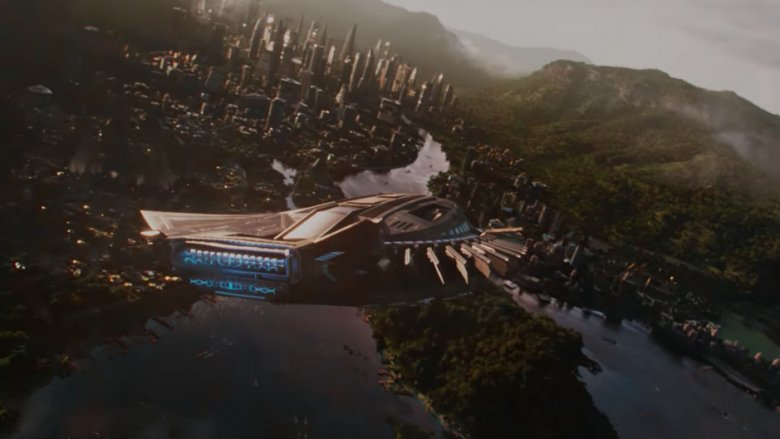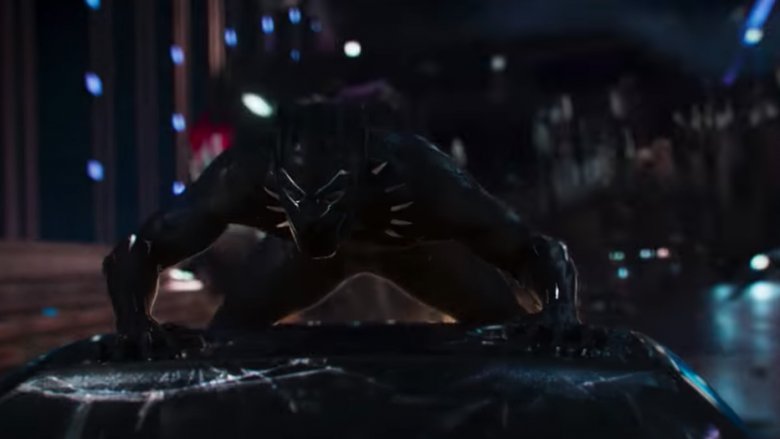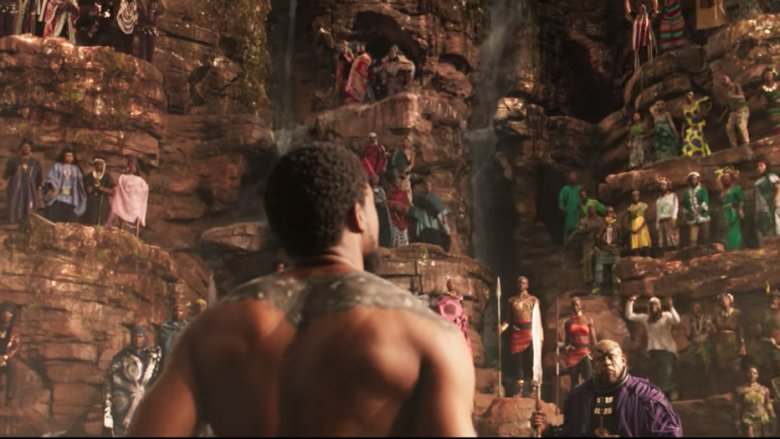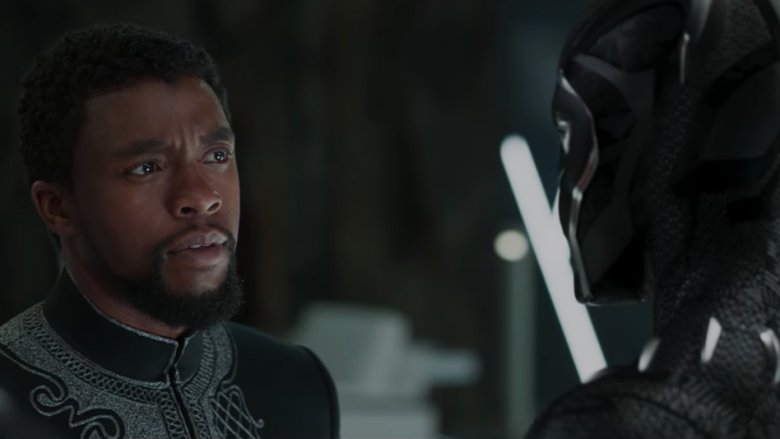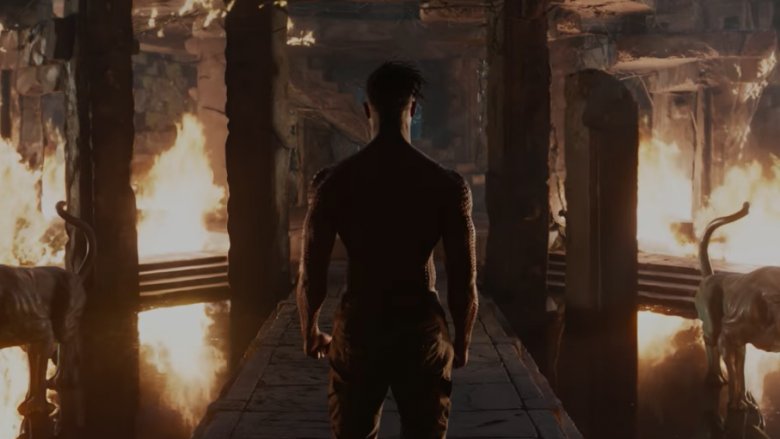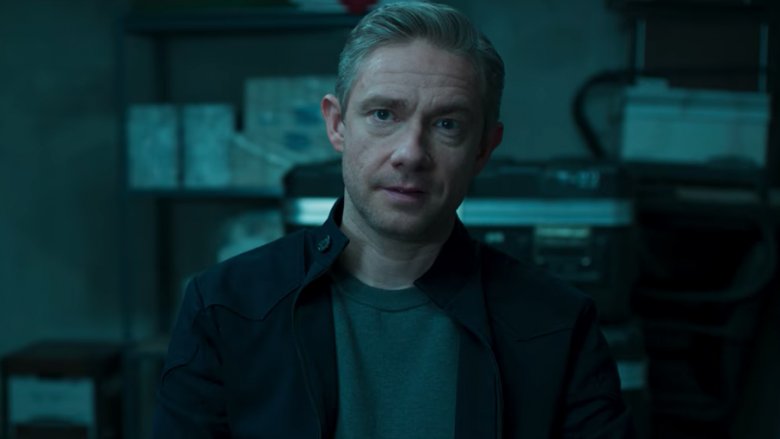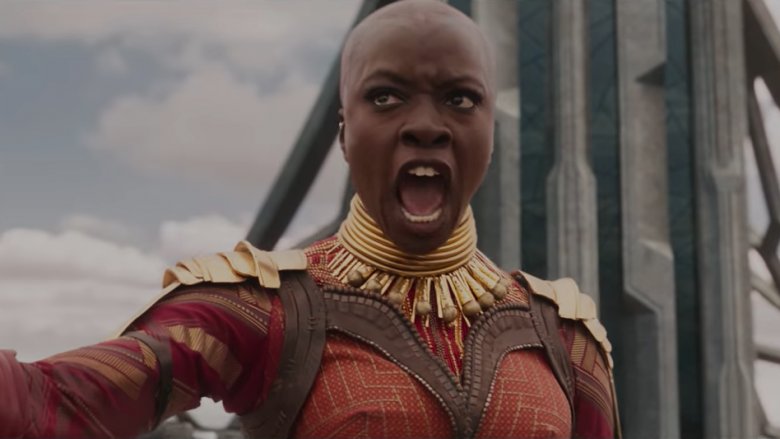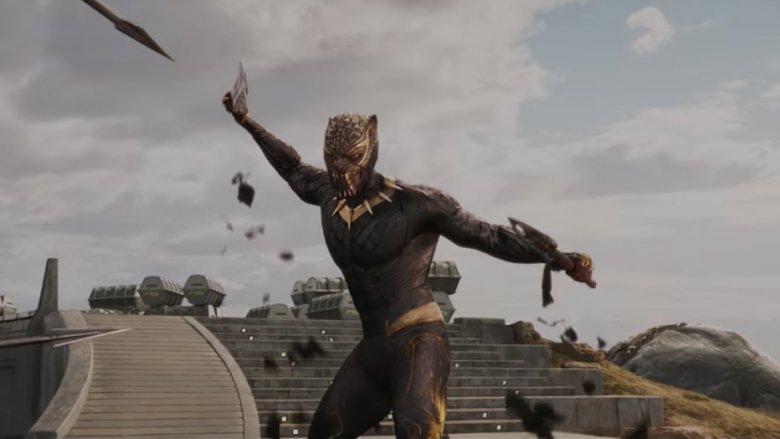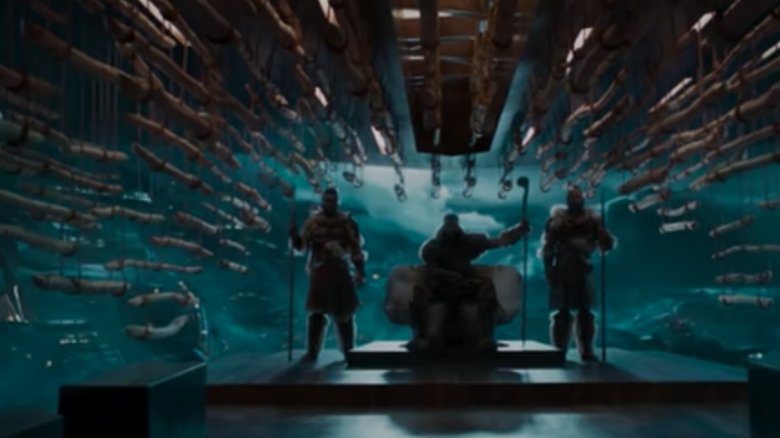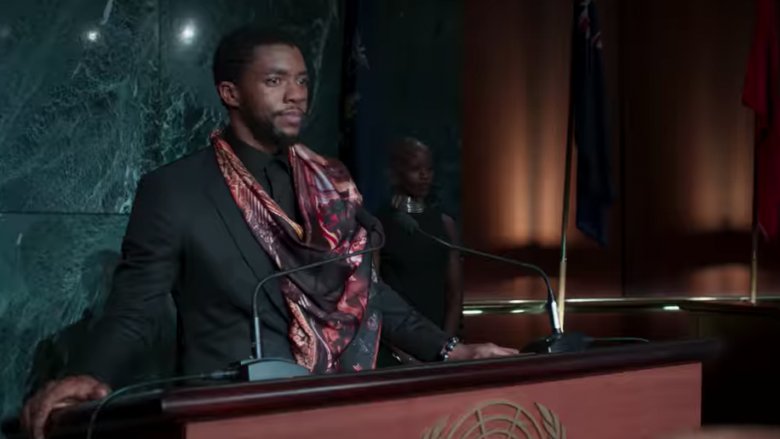5 Best And 5 Worst Things About Black Panther
Black Panther is finally here. The hotly anticipated latest installment in the Marvel Cinematic Universe has arrived, and it's arrived with a record-breaking bang.
The film brings the fictional nation of Wakanda to life under the expert guidance of director Ryan Coogler and features a cast of characters that all make for welcome additions to the MCU. Any franchise that is 18 movies deep is going to have trouble making new films feel fresh and innovative, yet that's exactly what Coogler has done with Black Panther. It's a breath of fresh air, something that feels increasingly rare in today's landscape of superhero cinema. We've broken down our favorite aspects of the movie as well as the bits that weren't quite as stellar. (Spoilers ahead!)
Best: Wakanda
Remember the epic battle of New York in the climax of The Avengers? Of course you do. It's the most memorable part of an already memorable movie. That finale is superhero theatrics at its finest. It's also devoid of a great deal of the gravitas it could display due to where it takes place. That is, despite being a real city, the Manhattan of The Avengers has no sense of place or life to it. It's just set dressing. As a result, the final battle feels like the rough equivalent of knocking over a Lego set. Most Marvel films, short of maybe Thor, suffer from this — a lack of place being well defined. Black Panther tackles this head on with the film's most memorable character: Wakanda.
No, it's not technically a character, but it's tough to point to any single facet of the film that works as well as Wakanda. Through its citizens, royal bloodline, design, and established rules and history, Wakanda feels like a real place, a living, breathing nation with a lived-in vibe that few superhero movies can effectively convey these days. When Wakanda begins to turn on itself at the film's climax, it matters. We care about what happens to it. Without sending a single Helicarrier crashing into a palace or cityscape, we feel the palpable damage caused to the nation through the events of the film. More importantly, we care about that repercussions of that damage.
Worst: The first act
There's something else Black Panther has in common with The Avengers. Well, something it has in common besides thrilling action, killer chemistry among its cast, a great villain, and all that jazz. Both films are incredibly engaging, and by their closing moments you've forgotten that their first acts are a little clunky.
Black Panther doesn't really feel like it hits its stride until Killmonger arrives in Wakanda. Once he does, the emotionally potent family dynamics and rivalry between T'Challa and Killmonger elevate the the film to a higher level. Still that first third of the movie is a bit shaky. Sure, it's got quite a lot to set up — from the rules and functions of Wakanda to T'Challa's various relationships with family and friends — but it makes for an uneven 45 minutes. Take the Korea sequence, which feels like a half-baked homage to James Bond. However, once the film gets going, it really gets going.
Best: A movie with something to say
We've discussed it at length before, but one of the biggest problems Marvel films struggle with is their lack of unique themes. Most Marvel films come down to the question "What does it mean to be a hero?" There are rare exceptions in films like Iron Man 3 and Guardians of the Galaxy vol. 2, but for the most part every film tackles the same question. Black Panther stands out as one of the few Marvel films to explore new themes and ideas, ones that are unique to its story and strengthen the film's emotional punch.
From the get-go, the film sets up a conflict of tradition vs. progression, specifically in regard to Wakanda's policy of isolationism. The technologically advanced nation keeps its developments to itself and T'Challa, as the new king, finds himself confronted with the idea that this has caused long-term damage to the outside world. His adversary, Killmonger, serves as an avatar of these negative repercussions and challenges not only T'Challa's beliefs but the very essence of old Wakanda. The film also explores colonialism and loyalty to friends and family over country, but both of these themes ultimately stem from the film's primary question. It's handled immaculately under Coogler's direction. He's managed to make the rare superhero film that is both fun to watch and intellectually engaging.
Worst: What CAN'T vibranium do?
We totally understand that MacGuffins are very much a necessity in comic books and the movies adapted from them. There has to be something the heroes and villains are fighting over, and it's almost always embodied in the form of a precious artifact or object of power. So it absolutely makes sense that vibranium, a fictional metal that is rare around the MCU but plentiful in Wakanda, serves as Black Panther's MacGuffin. The point where it becomes a problem is that it eventually turns into a contrivance.
Before Black Panther, the only real exposure to vibranium we've had in the MCU is in the form of Captain America's shield and within the robotic Ultron. Both are made of the precious metal. We don't know much about its properties or how it functions, only that it's hard — like, impenetrably hard. Expanding on its abilities in Black Panther is totally fair game. However, the film turns it from a rare impenetrable metal into a power source that seems to be able to accomplish pretty much anything the plot requires. It's the basis of everything from communication devices to a monorail system and at some point you've got to step back and wonder if there's anything it can't do. Very little of the writing in Black Panther comes off as lazy, but its utilization of vibranium to serve a myriad of plot devices could be handled much better.
Best: An engaging villain
It shouldn't come as a surprise to anyone who's been paying attention to his career but Michael B. Jordan is excellent in Black Panther. From The Wire to Creed, Jordan has made himself into one of the most engaging, magnetic actors working today, even bringing life to imperfect roles like Johnny Storm in Fantastic Four (honestly, he's probably one of the only good things in that movie). So it comes as no surprise that he turns in one of the best villainous performances in the history of the MCU. Let's not overlook the fact, though, that he had excellent material to work with.
Killmonger is a great villain not because of what he does or what he wants, but we understand why he wants those things and acts the way he does. The scariest thing about Killmonger is how easy it is to understand his perspective. You can't say this about Ronan the Accuser of GotG or Malekith the Accursed of Thor: The Dark World. Killmonger is a great villain because there's a humanity to him that will ring as all too familiar with viewers. You almost don't want to root against him at all.
Worst: Everett Ross
Point-of-view characters are imperative in superhero movies, especially ones introducing new worlds to the audience. The POV character can be the titular superhero (Steve Rogers is very much our door into his world in Captain America: The First Avenger) or they can be a supporting character like Jane Foster in Thor. Additionally, it's commonplace at this point for MCU films to feature smaller characters like fan-favorite Agent Coulson as connective tissue between movies taking place worlds apart, both metaphorically and literally. As such, Agent Everett Ross from Captain America: Civil War being included in Black Panther makes sense on paper. The problem is that he ends up being boring and even redundant.
For someone who functions as a POV character, Ross does very little to help acclimate the audience to Wakanda. The world has been well-established without him by the time he shows up in the country. He doesn't have a particularly compelling arc either. There are threads of a story about a man loyal to his own country being dismissive of Wakanda, only to find himself wanting to fight for Wakanda in the end, though it's never really explored. A character like him is at his best when, like Coulson, he sacrifices himself for the greater good, and by the film's end Ross hasn't even done that. Talented as Martin Freeman may be, the character never ends up living up to his potential and ends up sucking the life from most scenes he's in.
Best: Women of Wakanda
You've gotta feel for Chadwick Boseman. The dude absolutely kills it as T'Challa in Black Panther and still gets completely outshone by the supporting cast of Wakandan women, namely characters Shuri, Nakia, and Okoye. Black Panther's supporting cast already has a leg up on those of other Marvel films in the form of Jordan's Killmonger but then Lupita Nyong'o, Danai Gurira, and Letitia Wright come in and further steal the show.
Gurira's Okoye, the leader of the Dora Milaje army, shines as a steady, unwavering voice of reason (with awesome combat skills) while Nyong'o's performance as former GF Nakia defies typical superhero love interest expectations. In fact, despite their explicitly stated romantic history and tension throughout the film, Nakia never feels like she's shoe-horned in as a love interest for T'Challa. Rather, she's the sort of character you could just as easily center an entire movie around, a woman who left her paradise of a home to serve the greater good. It's also tough to point to anyone in the film who steals scenes quite like Letitia Wright as Shuri, T'Challa's kid sister. Now established as perhaps the smartest person in the MCU, Shuri brings genius-level intellect and innovation to the world of the Black Panther while also injecting the movie with a healthy dose of sass and comic relief. Call us crazy, but the next Black Panther installment doesn't even need to have its titular hero as long as these three return.
Worst: A final battle that gives us deja vu
Black Panther is refreshing in its refusal to recycle formulas, tropes, and story structures so often utilized by superhero movies. The romantic interest doesn't feel like a typical romantic interest at all. By having the main character disappear for a while (more on this later), it makes a daring choice in its second act that has never been attempted by a Marvel film. Perhaps most noticeable is its compelling villain who feels more human than any other antagonist in the franchise. Unfortunately, it didn't manage to avoid a particularly egregious trope.
How many times do we have to watch a superhero movie that ends with the hero fighting a villain with a slightly different version of their suit or powers? Between the first two Iron Man movies, Ant-Man, The Incredible Hulk, Guardians of the Galaxy Vol. 2, and a plethora of other non-Marvel films like Man of Steel and Logan, it's a trope that has run its course. Yet Black Panther, for all of its uniqueness, still ends with Black Panther's nemesis donning another Panther suit before the two duke it out. You can argue that Killmonger wearing the armor emphasizes the fact that he's a mirror image of T'Challa but the fact of the matter is that all too frequently that's the same metaphor all of those other movies are trying to tap into. Comic book movies present an entire universe of storytelling possibilities. Given this, we're pretty tired of watching heroes and villains with the same costumes and powers fight each other.
Best: The second-act twist
Introductory Marvel films like Ant-Man, Dr. Strange, and Iron Man tend to stick to a pretty strict formula. It's not that the movies are bad for using this formula, but it definitely starts to feel like if you've seen one Marvel movie you've seen them all. How does Black Panther avoid this pitfall? It kills its hero in the second act.
Admittedly, that's a slight exaggeration. No, T'Challa doesn't really die in his duel with Killmonger, and we highly doubt anybody in the audience truly believed he was gone for good. The crucial details are that the characters in the film believe him dead — and that T'Challa doesn't immediately return. Instead, something happens that's unprecedented in a Marvel film: A large portion of the film continues on without its protagonist.
Marvel films take a great deal of inspiration from the Hero's Journey template. This template requires that the hero be present. Black Panther breaks from this norm by taking the time to show the audience what happens in the wake of T'Challa's apparent death. We get to see how his friends and family react, what happens to the power structure of Wakanda, and what course of action his now-rebel comrades would take in order to restore balance to the throne in his absence. It's easily the strongest chunk of the movie, giving a depth to the story and its characters that no Marvel film has ever achieved.
Worst: The first post-credits scene
Marvel post-credit scenes tend to serve one of two purposes. They're either there for a laugh like the stinger in Iron Man 3 or serve the purpose of teasing the next films or sequels. The trend of having more than one post-credit scene has begun to pop up in the years since The Avengers (which featured one of each kind) and Black Panther proves to be no different. The problem is that the movie only really needed one of them.
The first post-credits scene in Black Panther features T'Challa formally announcing to what appears to be the U.N. that Wakanda will be doing away with its policy of isolationism. There's a slight laugh line when a diplomat suggests that the world doesn't need the resources of what it believes to be a shabby third-world country, but it's not really the focal point of the scene. This stinger is, unfortunately, both redundant and uninteresting. It doesn't set up any information we haven't already been given — the film's proper ending firmly establishes the opening of a Wakandan Outreach Center, so we already know they're doing away with their isolationism. It doesn't set up a sequel, give a look into the next film, or provide the audience with any new insight. Post-credit scenes are a big deal in the MCU, and this one unfortunately doesn't stick the landing at all.
